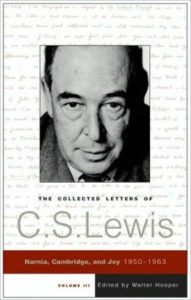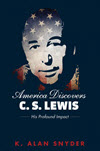 Reading through C. S. Lewis’s letters to Americans during my sabbatical was a genuine pleasure. There are so many nuggets of gold in those letters that I couldn’t include them all in my new book, America Discovers C. S. Lewis.
Reading through C. S. Lewis’s letters to Americans during my sabbatical was a genuine pleasure. There are so many nuggets of gold in those letters that I couldn’t include them all in my new book, America Discovers C. S. Lewis.
On the topic of suffering, for instance, here are a couple of gems. Writing to regular correspondent Mary Van Deusen on this topic, Lewis opines,
That suffering is not always sent as a punishment is clearly established for believers by the book of Job and by John IX. 1-4. That it sometimes is, is suggested by parts of the Old Testament and Revelation. It wd. certainly be most dangerous to assume that any given pain was penal.
I believe that all pain is contrary to God’s will, absolutely but not relatively. When I am taking a thorn out of my finger (or a child’s finger) the pain is “absolutely” contrary to my will: i.e. if I could have chosen a situation without pain I would have done so. But I do will what caused pain, relatively to the given situation: i.e. granted the thorn I prefer the pain to leaving the thorn where it is.
I agree that pain is not what God would want to inflict on anyone. After all, aren’t we told that in heaven there will be no more sickness or pain and that all our tears will be dried? He only inflicts some pain on us when necessary to remove greater problems in our life.
Lewis also made what some might consider a startling statement when he told Belle Allen that the suffering of the innocent didn’t bother him nearly as much as the suffering of evil men. What did he mean by that?
Do you know, the suffering of the innocent is less of a problem to me v often than that of the wicked.
It sounds absurd: but I’ve met so many innocent sufferers who seem to be gladly offering their pain to God in Christ as part of the Atonement, so patient, so meek, even so at peace, and so unselfish that we can hardly doubt they are being, as St. Paul says, “made perfect by suffering.”
On the other hand I meet selfish egoists in whom suffering seems to produce only resentment, hate, blasphemy, and more egoism. They are the real problem.
 These are just two examples why I delighted in studying how Lewis responded to Americans who wrote to him. His wit and wisdom is found not only in his published works, but in these personal communications also.
These are just two examples why I delighted in studying how Lewis responded to Americans who wrote to him. His wit and wisdom is found not only in his published works, but in these personal communications also.
Since my goal was to see what Lewis said to Americans, I didn’t read all of his letters to his own countrymen. That is something I hope to do at my leisure over the next few years.
I would be remiss if I didn’t close with a reminder that America Discovers C. S. Lewis can be found on Amazon and at this page on my publisher’s website. If you buy a copy, I hope you will be as taken by Lewis’s letters to Americans as I have been.
